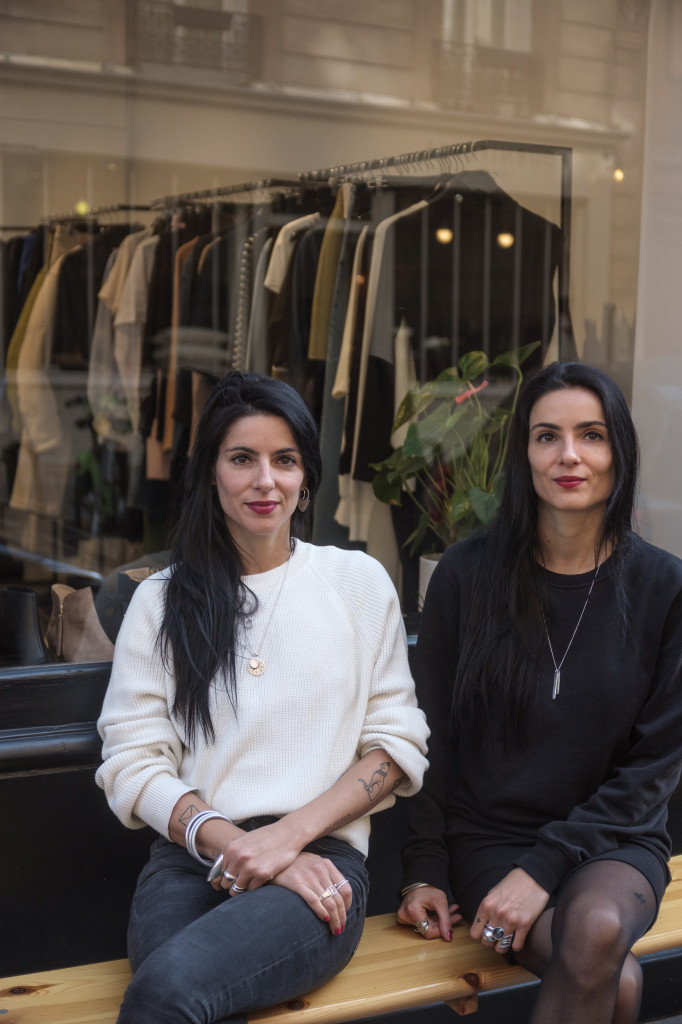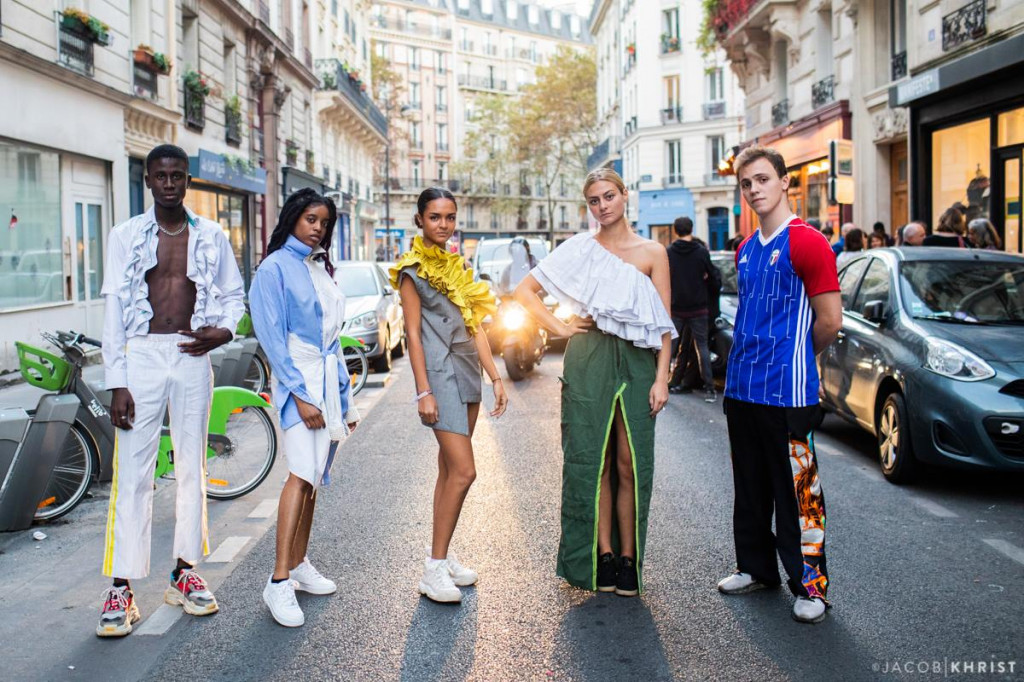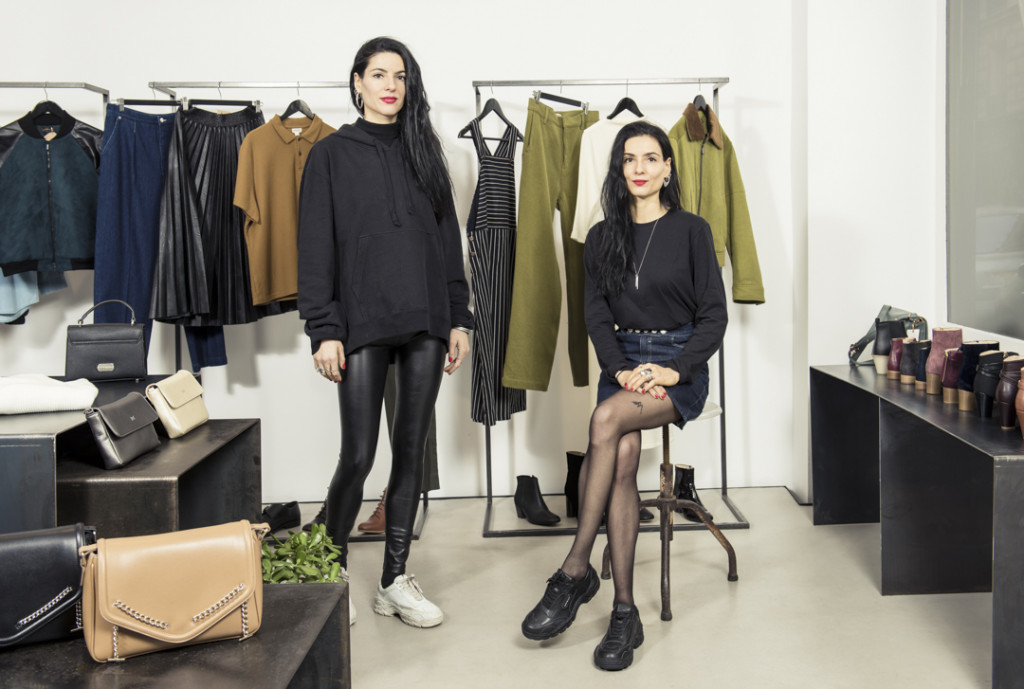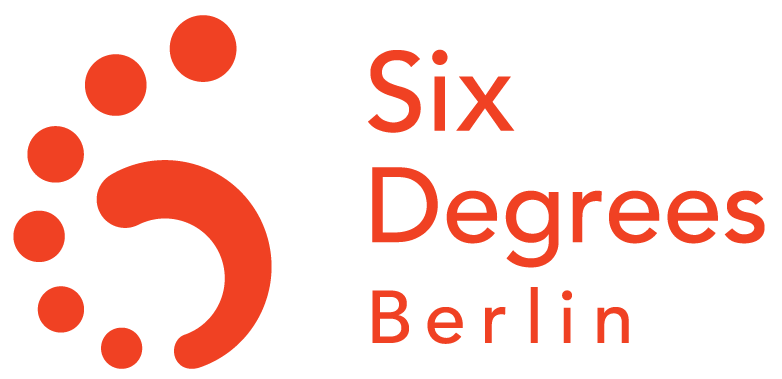Twin sisters Judith and Maud Pouzin have cofounded the first vegan and sustainable boutique in Paris: Manifeste011. Situated in the 11th Arrondissement, surrounded by other independent businesses (plus a vegan cheese shop not too far away), Manifeste011 is a well-curated boutique that draws in passers-by as well as a destination spot for discerning shoppers seeking ethical fashion. For at the heart of the boutique, alongside the sustainable and ethical principles guiding the sisters and all the designers represented there, are excellent aesthetics and taste.
The sisters happen to have complimentary skills in terms of running the business, but they decide together which labels the boutique carries. The coveted Parisian or French sense of style is on display with high quality basics and other items that will surely become wardrobe staples, for their construction and design. While still primarily focused on women’s wear, there is a small selection of men’s wear and pieces that are gender-neutral.

So what inspired you to open this boutique?Maud: Judith and I were already concerned about the environment, but were more focused on the waste and the food. After seeing The True Cost we were very shocked and the most importantly, we became conscious of the fashion industry. Before this documentary, it’s terrible but we knew something; we knew it can be awful to buy [certain things]. But as we began to read more about this fashion industry we were then obliged to do something. We really wanted to work together and we also noticed that in Paris and in France, we were very late compared to Los Angeles, Berlin, Sweden, and so on. We read more articles and spent time on Instagram. We became more intelligent (laughing) and decided to open a store that would allow people to discover a new fashion with good style. For us the most important thing is the style, it is not the fact that we are vegan or sustainable. That’s why we decided not to put it so big in the shop because for us, we can convince people with nice things, not with a speech, ‘We’re right, you’re wrong!’ No. All people can be involved in something if they like the product or thought.
Judith: That’s the thing: maybe sustainable fashion has not succeeded in convincing people over the years because the first fact they say is a speech about the product: it’s well done, people are well paid, et cetera. We think in order to become a great success in sustainable fashion, one has to focus on the product, the quality, of course, but also the style. Here, a lot of people enter the boutique and don’t know that it’s a sustainable or vegan fashion boutique. They like the product, they like the style [first], then they learn about the product, about the world. For us, this is the most important thing. Afterwards, they learn that it’s sustainable and they’re happy because they’re maybe almost proud to buy the product. Because yes, it’s beautiful but it also has a kind of sense [of principle].
Maud: We imagine our shop as a place where people can meet and discuss, and even if they do not totally agree with each other, they can have a conversation and learn something. That’s really why we organize events. Like the one you were at, but also events for Fashion Revolution, or Anti-fashion, or in the schools, because for us information is le nerf de la guerre (the heart of the matter). Information is the most important thing to make people change. If people are informed, they can change things. But if they don’t know, it’s more difficult to change.
Judith: You can’t blame people if they don’t know how they can change, but you have to inform them. The worst thing is to know but not change. When you are informed about what you are doing when you buy this product here versus what or who you are supporting when you go to Zara (or another fast fashion shop), this is what you have to know to be a conscious consumer.
Maud: I’m not a fan really, but even so, we cannot go to H&M anymore. It is impossible for me, even if I need something small. Sometimes it can save time because it’s easier to go there but I just can’t—and this is good.
Judith: Yes, even if we have no money, or we really have to buy a black tee shirt—no, we won’t go there.
Maud: Because we know is why we can’t. Now it’s been over a year that we are open, and we are very happy to see that the people who come here are vegan, are fashion students, or are just walking past and think, ‘Oh it’s a nice shop, I want to enter.’ It’s a lot of people who are just beginning to wonder, ‘Maybe I can change’ and have some questions and are interested in this kind of fashion. It’s really cool because they come here and we start to discuss some things.

This image is from a Manifeste011 event I attended, a presentation of the work of CASA93. From the press release, CASA93 is a “free and unconditional fashion school [providing] professional training for young untapped talents that reinvents fashion education, by proposing a methodology of pedagogical, social, human and urban innovation based on the collective. CASA93’s mission is to train the young creative talents of tomorrow in the various fashion professions in order to integrate them into the job market.”
Did either of you work in fashion before?
Maud: No, I worked in music but my friendship circle is in fashion and art, so I know the fashion industry. I have a friend who is a stylist for Christian Lacroix, another friend who is a photographer-stylist, and my roommate is a fashion stylist so I know this industry. But I don’t like this industry because they often tell me (during fashion week for example) a lot of little stories. But there are also a lot of people who come from this part of fashion and are changing. For example, I met the woman who did very important work for Balenciaga for a long time. Once, she went to Bangladesh because the production was late. There she discovered the sweatshops; it was hidden but she discovered the reality. She decided to stop and now she’s the president of Fashion Revolution France. She has her own brand and she has two children, which is cool—when she was at Balenciaga she couldn’t imagine having children.
How about you, Judith?
I used to study business so I take charge of all business aspects. We are totally complimentary because Maud takes charge of events and communication and I do the other side, the back office. (Maud: The most important thing) Yes, I know. We worked in sectors that don’t have any aspect in common with fashion. I think it’s good that we have not worked in fashion before because we have maybe another take on it.
Do you do the buying together?
Maud: Yes, we do. All decisions are made together. It’s very important.
Judith: The big decisions anyway.
Maud: We are very open-minded if someone wants to propose something to us. What is very important and what we really enjoy is that we meet a lot of people, all the time. This year I met more people than I have met for years, so that’s why we can say there is a good energy. But we are in Paris; it’s true. If I go to a little city in the south of France, maybe it would be more difficult to talk about sustainable fashion.
Is this your first project together?
Judith: Yes.
Maud: It took time.
It’s quite lucky you get to work together.
Maud: We have to tell you it’s not always easy because we are very close and sometimes we don’t take care…Sometimes we should be nicer. It can be a weakness but it is also a strength.
Judith: When you speak with your friends or your partner, you speak to him or her with kindness. With my twin sister when we have something to say or decide, we aren’t careful, we [just] say it. Then after: ‘Oh sorry, maybe I could have been nicer.’ But when there are crises, they don’t faze us.

How did you choose this location?
Maud: We knew someone who knew the woman who had a shop here and had decided to retire. She proposed to us that we take over the space. We wanted to do things quickly because we worked for a long time on the project, two years, and we were ready. So we decided to open here, quickly. Sometimes, we wonder if it would be easier to be in the center of Paris because it’s far from Le Marais, et cetera. But we have to admit that people come here, even if it’s far from the center. We are lucky.
Judith: Yes, before Maud and I had this boutique, we never went here. I am in the 18th Arrondissement, she’s in the 19th and we never came to this area. (Maud: We stop at Bastille, you know?) Yes, this is the positive line. (Maud: But I really enjoy this area and it’s changing.) Yes, it’s very cool. For example, there are a lot of vegan shops, a patisserie, and a cheese market.
You have a nice little ecosystem.
Maud: Yes. And it is important for us to have values for the products we sell here but we also try to have a better society and a social enterprise. For example, our energy is from Innercorp, it is solar and wind energy. It’s a little more expensive but it is our choice. We save a lot of the packaging—even for sustainable brands; it’s a shame. We make all the labels from packaging we’ve received that we stamp with ecological ink. We don’t give out bags when something is bought. We ask people to have their own bags, the same as when they buy food. We also produce three types of bags for people who want to buy a bag. (Judith: We sell them at the production price.) They’re made from organic cotton, and the label is GOTS, Global Organic Textile Standard. So if people need bags, we can sell them bags they can reuse.
Judith: We bring all our bags from home to the boutique and when people don’t want to buy a bag, we reuse these other bags. We give them for free and we try not to produce material. Finally, we try to limit our carbon footprint here. We are not perfect, of course, and we try to do better. People like that and like that we explain what we are doing here. And all the materials, all the metal here in the boutique is furniture made for us from recycled metal. We didn’t want to buy furniture; we wanted to reuse something that existed before us. So that’s it.
So the materials are also locally sourced. (Yes.) Have you managed to find French designers who are sustainable or vegan?
Judith: Of course we have French designers in the boutique, but we have more European brands—ones from England and the north of Europe (like Denmark or Finland). Maybe we are late here in France but things are changing and we are very happy for that. It was not easy at the beginning of Manifeste011 when we tried to find French designers that were sustainable and vegan. There were almost only sustainable lines from which we could pick vegan styles. It was very difficult at the time because we felt that French designers put their attention on the speech around the product and not on the product itself. Now, we’re very excited to see all the new brands. But two years ago, it was not the same.
Where does the name come from?
Maud: Ah, there’s a real story. Do you know Lidewijl Edelcoort? TrendUnion is a very famous company of Lidewijl. Four years ago, this woman wrote an anti-fashion manifesto. We read it and were very inspired by this manifesto because it shows that the fashion industry is really old-fashioned now—old fashioned, ha! So Manifeste is an allusion to this manifesto and zero is the beginning of something, something new.
Judith: Since this is the first vegan and sustainable fashion boutique in Paris.
Maud: And the eleven, it’s the month November. The Vegan Society, a British organization (established in 1944, very old) decided in 1994 that November is the month of veganism.
Judith: And it’s not for the 11th Arrondissement of Paris, where this boutique is. We registered the name before finding this space!
Judith, I think you were saying something about how things weren’t perfect, but a work in progress. Whether it’s the consumer or the products here, can you talk about the discussion you have with people when they come in?
Yes, for us it’s very important to [explain things], because finally the consumers—people (I don’t like the word consumers) who come here are very various. They come here because they are vegan and they want to find vegan fashion; there are people who only are curious because they’re walking down the street, see the products, and think, ‘Oh, it’s beautiful’ so they come in; or they are people who are interested in changing their way of consuming fashion. The most important thing for us is to speak with people who come here and explain what we are doing and speak about the brands.
We realize that people like this; they like us to speak about the brands because we are passionate, and they want to know what they are buying. And of course the product is the most important: the style, the colors, and the size.
Maud and I realized people love to be informed and love to know the story behind the product. That’s why it is very important for us to meet all the designers or the brands to know their story and to speak about them with passion.

You mentioned that you found a lot of the brands through Instagram and through some platforms?
Maud: As I said, we worked for two years before opening and read a lot of articles, most of which came from other countries. When we looked for French brands at this time, they were difficult to find. The styles were very ugly. [The boutique] is our taste but it’s important that there is this kind of fashion (sustainable and vegan) for people who like this kind of fashion (taste-wise).
Fashion is a big word. We really wanted to open a store with fashion but for us it is important that some people, if they just want to buy an organic tee shirt, can buy one. In France, we have this kind of shop online—it exists. But we wanted to show people that it is possible to have a real shop with fashion, with shoes and bags, and where if you don’t know that it is sustainable and vegan, you don’t remark anything. It is important for us.

14 Rue Jean-Macé, 75011 Paris, France



0 thoughts on “Manifeste011: Paris’ first sustainable & vegan fashion boutique”